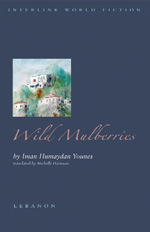
Set in the 1930s in rural Lebanon, Wild Mulberries is a slim book about a world in transition. A crumbling silkworm farm run by a man who refuses to see a new world knocking at his door serves as the backdrop for a young girl's harsh introduction to the realities of a life stripped of its former finery.
Wild Mulberries is the story of Sarah, whose father, the shaykh, runs a silkworm farm in the tiny village of 'Ayn Tahoon. He is a poor businessman, poor husband and poor father. His failures in these fields have resulted in poverty, a missing wife and estrangement from his children (Sarah and her half-brother). World War I is not long finished, and a new world has been born in its wake. The shaykh refuses to acknowledge the changes in the world, and his business and house are decaying as a result. The other inhabitants of 'Ayn Tahoon include Sarah's unmarried Aunt, the faithful servant Ibrahim and the formerly glamorous Muti'a, all of whom see their lives decomposing along with the unsold silk cocoons. Sarah, meanwhile, dreams of escape, following the path she believes her mother may have taken years before. The book follows her as she searches for her path away from the decay.
Wild Mulberries is an odd book, leaving much of what is important unsaid. Initially, it is simply an observation of Sarah's interactions with the others trapped in 'Ayn Tahoon. Although the village is presented as a rural backwater, unaffected by the passage of time, there are hints that it is much more connected to the rest of the world than first appears. Sarah's mother's family are not Lebanese but Argentinian, Muti'a is Syrian, one farm worker is Kurdish, another Armenian, and a fire in the village is tackled by a man referred to, only once, as 'Tony the Australian'. Younes drops these origins in without further explanation. Sarah's search for her mother leads her to England and the possibility of illegitimacy, but the idea is no sooner raised than it is ignored. It is as if Younes wants her readers to share in the ignorance of history, to understand life as Sarah understands it, and no further. The unusual setting of a rural backwater populated by a decidedly cosmopolitan cast suggests that 'Ayn Tahoon's story has much more to do with the encroachment of the outside world, both contemporaneously and historically, than first appears.
Younes' style inevitably leads to frustrations. Her unwillingness to explain her narrative means that many of the events
are mystifying, and large parts of Sarah's journey appear aimless. Without enough information to understand parts of the
story, the whole thing becomes almost ethereally difficult to grasp. I suspect this was part of Younes' plan, but it may
have succeeded too well in places. I finished the book only slightly wiser but much more bemused than when I started it.
I like to be challenged as a reader, but by the end I felt that Younes’ had asked too much of me, and that I had failed
to respond. It's a short book and a fairly easy read, but, for me, its failure to engage left me feeling strangely
unsatisfied.

Interlink Publishing, paperback, 9781566567008
